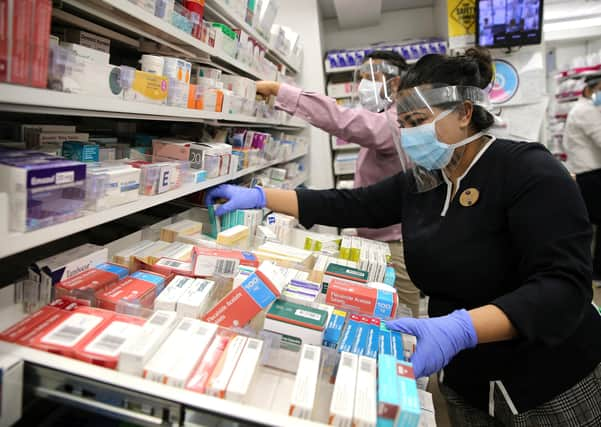Campaign launched to lessen pressure on A&E departments


People are being asked to make use of their local pharmacy, GP practice, local minor injuries unit or NHS 24 if they need assistance.
A new public information campaign titled ‘Should you go to A&E?’ is being launched to help make sure people continue to get the right care that they need and in the right place.
Advertisement
Hide AdAdvertisement
Hide AdBy continuing to follow public health guidance, people can help ensure Accident and Emergency Departments are ready to quickly treat those who need urgent care from emergency specialists.
The NHS inform website can be used to access advice on common symptoms, guidance for self-help and where to go if further medical care is needed.
The NHS 24 Mental Health Hub and Breathing Space telephone helpline can provide mental health advice and guidance.
NHS 24 and the Out of Hours service should be used when people are too ill to wait for GP practices to open and can provide the clinical advice and help.
Advertisement
Hide AdAdvertisement
Hide AdLocal community pharmacies can give help in treating minor illnesses such as coughs, earache and cold sores, along with common clinical conditions such as Urinary Tract Infections.
Those with non-life threatening but painful injuries such as a deep cut, a broken or sprained ankle or a painful burn injury should contact their local minor injuries unit.
Local GP practices can still be contacted during the day for an appointment or over the phone advice while Accident and Emergency Departments remain open for emergency care, with public health measures in place to protect staff and patients.
Health Secretary Jeane Freeman said: “During this first phase of the pandemic you have followed our guidance closely and when you needed medical care you used your local pharmacy, GP practice, local minor injuries unit or you called NHS 24 for medical and mental health advice and help.
Advertisement
Hide AdAdvertisement
Hide Ad“As we safely and carefully resume NHS Scotland, we need you to continue to do this. We need you to continue to access the right care you need and in the right place.
“While the NHS is there for you, we don’t all need to go to accident and emergency as for many of us, it is not the right place for the care we need. Sometimes self-help may be the quickest way to resolve your health problem and the NHS Inform website provides advice on common symptoms and guidance for self-help.
“Our Clear Your Head website also provides specific advice to support mental health. The campaign we are launching will help ensure you have the information you need to get the care you need, closer to home, and often with no waiting time at all.
“In an emergency you should always call 999 or go to your nearest accident and emergency department. By continuing to do what we have been doing throughout this pandemic, we will continue to help our doctors and nurses, and ensure accident and emergency provides the fastest and often lifesaving care for people when they really need it.”
Advertisement
Hide AdAdvertisement
Hide AdVice-president of Royal College of Emergency Medicine Scotland, Dr David Chung, added: “People in Scotland have responded fantastically during the Covid-19 pandemic and they have played an important role in helping to protect NHS Scotland by using their local emergency department in a sensible way.
“We want to make it easier for patients to be seen in a way that keeps everyone safe. This may mean that making one visit rather than several, and ensuring you access the service you really need, rather than the one that happens to be open at that time.
“To help us do that, we would ask you to use NHS advice lines or online resources. Accident and Emergency Departments remain completely open for emergencies as we have throughout the pandemic, and we know patients who need emergency care are not staying away anymore. We have got the balance right but we need people to use emergency services sensibility to prevent new infections arising.”
Pharmacist and Director of Operations for Community Pharmacy Scotland, Matt Barclay, said: “The vast majority of the public have been understanding with the safety measures put in place and have continued to access the expertise of community pharmacy teams throughout this pandemic.
Advertisement
Hide AdAdvertisement
Hide Ad“It has been a challenge for everyone however the community pharmacy network in Scotland will continue to deliver for the public in any way we can. For any minor illnesses and queries around medicines we would encourage people to think ‘Pharmacy First’ and the pharmacist will do what they can to appropriately support patients through advice, referral if necessary or treatment.
“By doing this we know we can support patients and the wider NHS by playing our part as accessible healthcare professionals, making sure people receive the right care in the right place.”
Comment Guidelines
National World encourages reader discussion on our stories. User feedback, insights and back-and-forth exchanges add a rich layer of context to reporting. Please review our Community Guidelines before commenting.